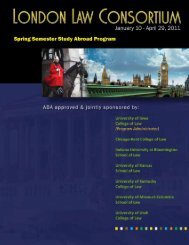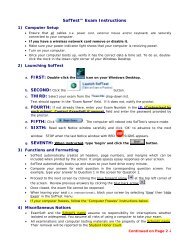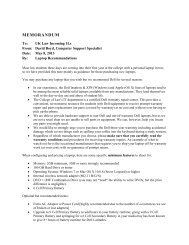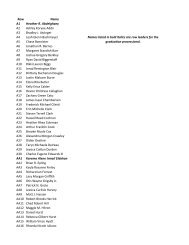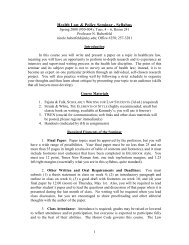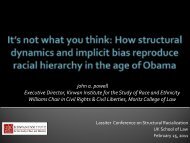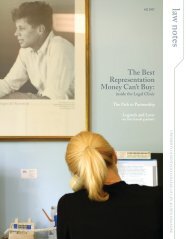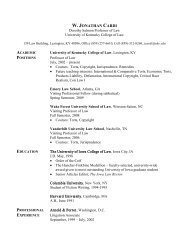law notes - University of Kentucky College of Law
law notes - University of Kentucky College of Law
law notes - University of Kentucky College of Law
Create successful ePaper yourself
Turn your PDF publications into a flip-book with our unique Google optimized e-Paper software.
closing argument<br />
Bizarre love triangle:<br />
The Spending Clause, Section 1983, and<br />
Medicaid Entitlements<br />
by Nicole Huberfeld, Willburt D. Ham Associate Pr<strong>of</strong>essor <strong>of</strong> <strong>Law</strong><br />
The first two terms <strong>of</strong> the Roberts Court have<br />
indicated willingness to revisit precedent, even<br />
decisions that have been considered long-settled.<br />
The Supreme Court can signal intent both by the<br />
petitions for certiorari that it grants and those that<br />
it denies, but it appears that the Court is poised to<br />
reinterpret another area <strong>of</strong> jurisprudence: the private<br />
enforcement <strong>of</strong> conditions on federal spending<br />
against states through actions under 42 U.S.C. §<br />
1983. The most recent precedent that speaks to the<br />
issue is Gonzaga <strong>University</strong> v. Doe, a 2002 decision<br />
that made it more difficult for individuals harmed<br />
by violations <strong>of</strong> federal <strong>law</strong>s to enforce statutory<br />
rights through section 1983 actions. Federal circuit<br />
and district courts have inconsistently and confusingly<br />
applied the Gonzaga framework, but the<br />
Rehnquist Court was uninterested in revisiting the<br />
rule after Gonzaga was issued.<br />
Last term, however, the Roberts Court granted a<br />
petition for writ <strong>of</strong> certiorari in a Medicaid case that<br />
would have required that the Court revisit Gonzaga.<br />
Before it could be heard on the merits, the respondents<br />
voluntarily mooted the case, but petitions<br />
for certiorari regularly arise in similar Medicaid<br />
enforcement actions. Thus, the context in which<br />
Gonzaga could be revisited is the enforcement <strong>of</strong><br />
Medicaid statutory entitlements via section 1983.<br />
The sheer quantity <strong>of</strong> lower federal court cases could<br />
lead the casual observer to believe that Medicaid<br />
providers and enrollees have a firm foundation to<br />
enforce Medicaid entitlements through section<br />
1983, but recent events reveal the fragility <strong>of</strong> the<br />
section 1983 enforcement mechanism.<br />
Federal court decisions regarding enforcement <strong>of</strong><br />
federal spending statutes through section 1983<br />
exhibit hostility to enforcement actions by beneficiaries<br />
<strong>of</strong> federal spending programs. Changes in<br />
the Court’s composition may allow this view, previously<br />
expressed as dicta, to become the prevailing<br />
rule. The juridical hostility to section 1983 actions<br />
is exacerbated by a divide in the circuits regarding<br />
application <strong>of</strong> Gonzaga to the Medicaid Act that<br />
narrows both patients’ and healthcare providers’<br />
ability to enforce Medicaid entitlements. This divide<br />
is further complicated by a Seventh Circuit theory,<br />
adopted by a few circuits, that the phrase “medical<br />
assistance” in the Medicaid Act merely requires<br />
states to pay, not to provide care or services.<br />
Additionally, the Deficit Reduction Act <strong>of</strong> 2005<br />
turns long-standing premises <strong>of</strong> Medicaid up-side<br />
down by allowing states to provide the “actuarial<br />
equivalent” <strong>of</strong> benefits that historically had been<br />
mandated by federal <strong>law</strong> and thus enforceable<br />
through section 1983.<br />
Though Congress has supported Medicaid<br />
enrollees’ access to federal courts (by blocking<br />
legislation that would have quashed section 1983<br />
causes <strong>of</strong> action), Congress has never modified the<br />
Medicaid Act to include a federal action. Congress<br />
should do so; and it should consider an administrative<br />
remedy that would incentivize the Centers<br />
for Medicare and Medicaid Services to protect<br />
both Medicaid and its enrollees. With the number<br />
<strong>of</strong> uninsured at 47 million and growing, Congress<br />
should not continue to assume that the Court will<br />
be willing to smooth out these kinks. •<br />
34 <strong>University</strong> <strong>of</strong> <strong>Kentucky</strong> <strong>Law</strong> Notes



